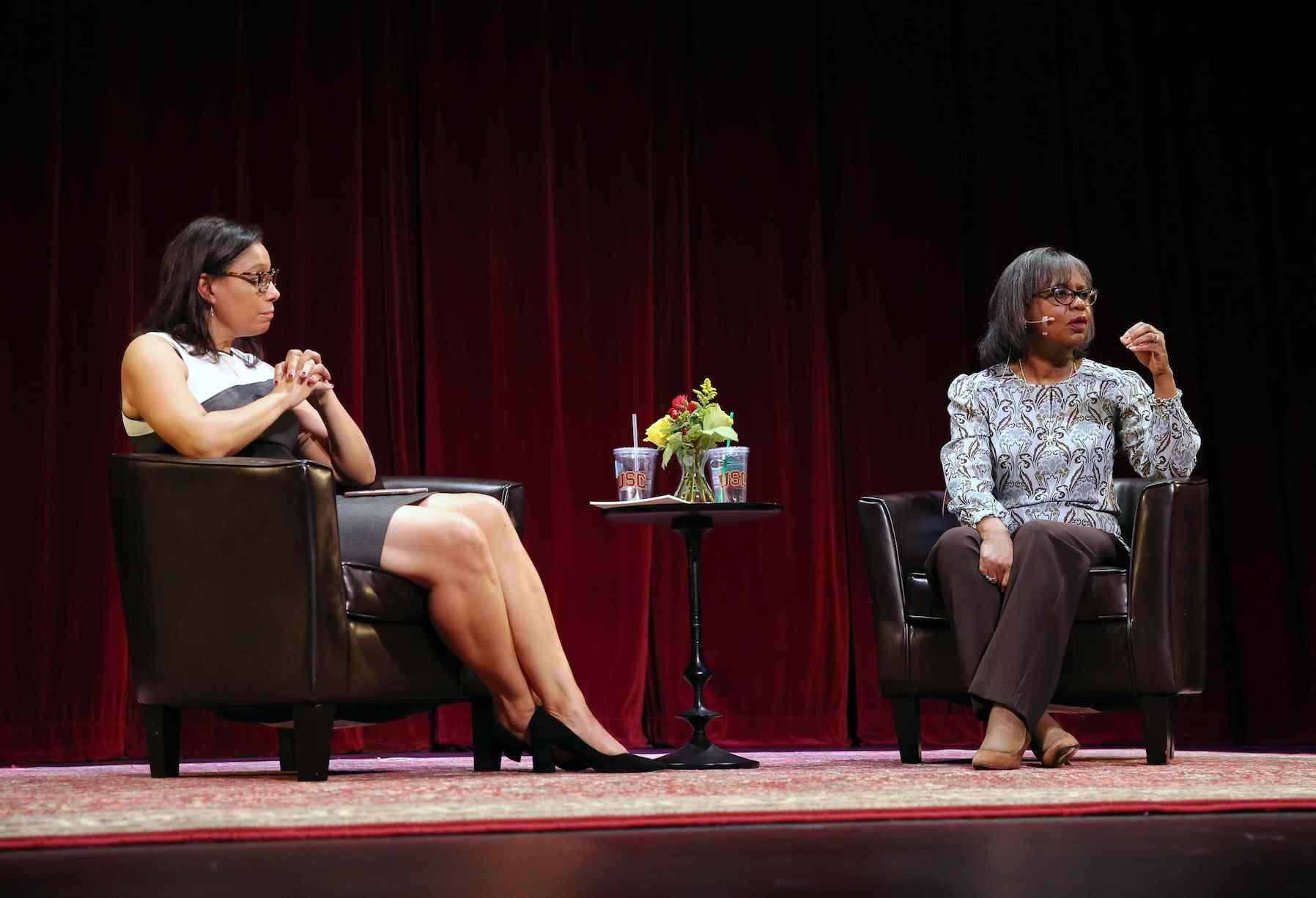Anita Hill discusses sexual harassment

Anita Hill speaks to a crowd of USC students and faculty in Bovard Auditorium. (Photo courtesy of Michael Glier)
In 1991, Anita Hill became the first woman to publicly testify against the nomination of a Supreme Court justice on the basis of sexual misconduct. Almost 30 years later, after the rise of the #MeToo movement, Hill’s story is more relevant than ever.
Hill, who was greeted with a standing ovation in Bovard Auditorium, spoke to hundreds of USC students and faculty members Thursday afternoon about the systemic causes and effects of sexual harassment. Political science professor Ange-Marie Hancock moderated the conversation.
“We’ve got to think of sexual harassment as a safety issue, as a civil rights issue, as a health issue, as a business issue,” Hill said.
Hill, now a professor at Brandeis University, is best known for her 1991 testimony against Clarence Thomas, then-nominee to the Supreme Court. Hill worked as Thomas’ assistant in the early 1980s, when she said Thomas sexually harassed her. She testified about her experiences before the all-white male Senate Judiciary Committee. Thomas was eventually confirmed to the Supreme Court.
Following the hearings, 1992 saw an increase in the number of women elected nationwide. The year was coined the “Year of the Woman,” and Hill became a national symbol for survivors of sexual assault.
The Bovard event was originally scheduled for a smaller venue, but high reservation numbers moved the discussion to a more spacious location.
Hill spoke about the importance of collecting long-term data to understand the scope of systemic sexual harassment’s negative effects on victims and the institutions in which they occur.
“What impact does the prevalence of harassment have on the people who weren’t harassed, but who are witnessing it?” Hill said. “Because living, [working or training in an environment] will have an impact on your trust in the institution and on your own behavior.”
The issue of sexual harassment covers many areas of public concern, and Hill said she was confused why it hasn’t been treated as a business crisis. “We know that it can impact people’s economic well-being, we know it can impact institutions’ economic well-being,” Hill said.
Hill was referencing mishandling of sexual misconduct allegations against executives from Uber and Google have recently resurfaced, drawing negative public attention to the companies.
Hill also spoke at length about the intersections of race, gender and other societal factors that affect victims of sexual harassment. To illustrate her point, she cited a New York Times article that said the recent Brett Kavanaugh hearings had nothing to do with race in comparison with the Hill-Thomas hearings of 1991.
“There is a neutrality of whiteness that is still in operation,” Hill said. “Any time you’re talking about elitism and privilege in the same conversation as whiteness, then race is a factor. When you’re talking about the privileged life that Brett Kavanaugh lived … race is a factor. Race is always a factor.”
When an audience member asked Hill what she would have asked Kavanaugh during the hearings, Hill responded that she would ask him how he views his own power, and whether he considers his power to be a weapon.
Hancock Alfaro asked Hill for her thoughts on an incident that occurred on campus last month, when Young Americans for Freedom, a conservative student organization on campus, displayed a sign that read: “It’s a Dangerous Time for Men — Change My Mind.”
Relating the display to her own experience in 1991, she said her job is not to change the mind of someone whose mind is already made up.
“My job was to say what happened, and it was their job to come in with an open mind and to understand … why what I was saying was important,” Hill said. “When people say, ‘change my mind,’ it tells you … their mind is already made up.”
Hill said the power and wealth that white men preferentially experience have not changed during the course of history. She added that while she didn’t know who wrote the sign, she “would imagine it was a young white man.”
Hill said that when she felt demonized by those who did not believe her testimony, she found comfort in those she was closest to. Looking back almost three decades, Hill had some advice for the audience.
“[Survivors] want to see reflected back, in the people they confide in, the good in them,” Hill said. “Embrace yourself, embrace the people who care and love you, [and] get rid of the people who don’t.”

